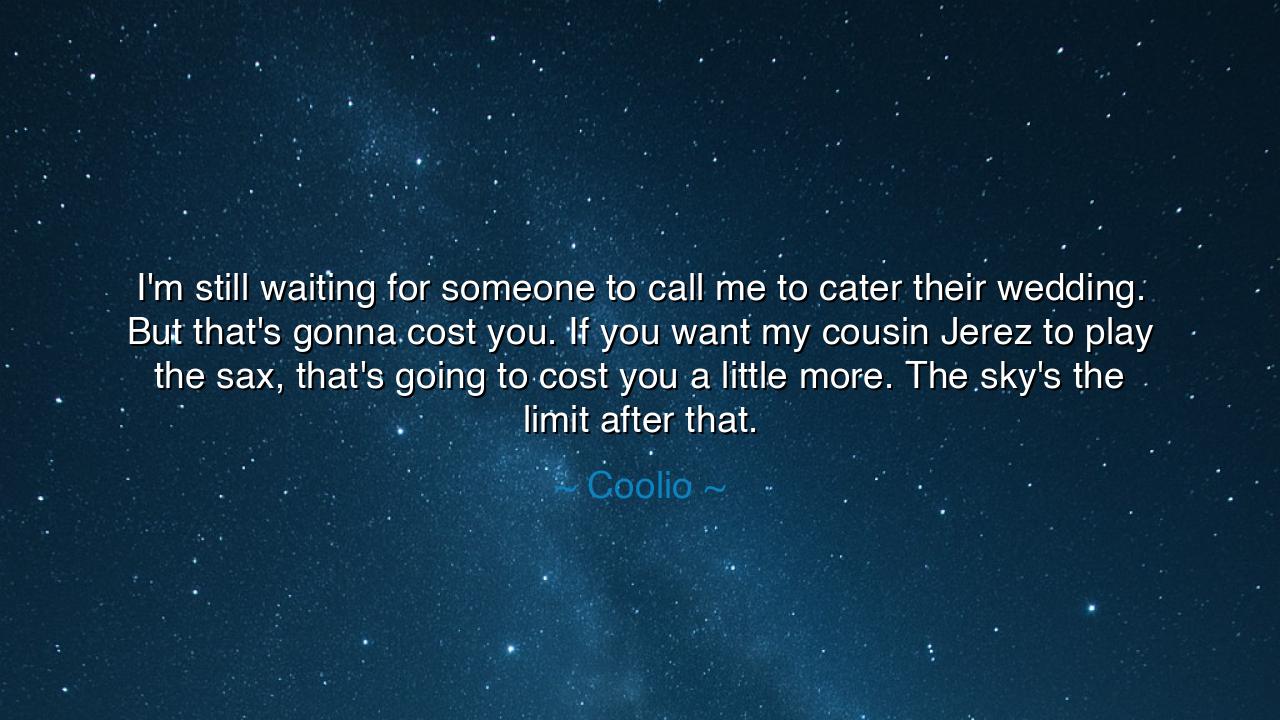
I'm still waiting for someone to call me to cater their wedding.
I'm still waiting for someone to call me to cater their wedding. But that's gonna cost you. If you want my cousin Jerez to play the sax, that's going to cost you a little more. The sky's the limit after that.






In the words of Coolio, spoken with laughter yet bearing hidden wisdom, we hear the spirit of a man who knows both the value of his craft and the richness of his community: “I’m still waiting for someone to call me to cater their wedding. But that’s gonna cost you. If you want my cousin Jerez to play the sax, that’s going to cost you a little more. The sky’s the limit after that.” Though framed in jest, this saying carries a deeper truth about the worth of labor, the joy of family, and the limitless creativity that surrounds the sacred rite of weddings.
He speaks first of catering, the feeding of guests. In ancient times, feasts were not merely about nourishment but about honor. To break bread together was to bind kinship, to weave bonds of loyalty. Thus, when Coolio imagines himself preparing the feast, he alludes to the ancient role of those who served at the tables of kings and heroes. Yet he also reminds us: such service is not free. To prepare with skill and spirit has value, and value must be honored. In this he teaches that labor, whether in the kitchen or upon the stage, is holy and must not be cheapened.
And when he speaks of Jerez and the saxophone, he reveals another layer of meaning: the celebration of family and the inheritance of music. For just as in Greece the lyre was passed from master to student, or in Africa the drumbeat was given from elder to child, here too the power of music is entrusted to kin. To summon his cousin is to remind us that family is not only blood but a chorus of gifts, each member bringing forth their own note to the song of joy.
History recalls how at the marriage of Alexander of Macedon and Roxana, not only warriors and generals were present, but musicians, poets, and dancers, for the union of two hearts was also the union of nations. Coolio, in his playful declaration, echoes this truth: that a wedding is not only the joining of two souls, but a stage upon which the arts, the food, the laughter, and the shared talents of community are displayed.
His final words, “the sky’s the limit,” soar above jest and rise into prophecy. For in truth, love’s celebration has no ceiling, no border, no boundary. Each couple may dream as they will, and each community may gather to raise that dream into reality. Thus, Coolio’s light-hearted quote becomes a teaching for future generations: value your gifts, honor your family’s talents, and never fear to dream beyond the ordinary—for in love, as in art, the sky is truly the limit.






UGUser Google
Coolio’s lighthearted approach to wedding catering shows how personality and connections can bring a unique flair to events. The idea that it’ll cost more if you want his cousin to play the sax is funny but also points to how much value we place on personal touches for big moments like weddings. Do you think people are willing to invest in such experiences to make their weddings stand out, or do you think they lean more towards the traditional and less personalized options?
SWNum Si wit
Coolio’s humor about wedding catering and offering his cousin’s saxophone skills made me smile. It got me thinking about how celebrity status can turn ordinary events into extraordinary ones — even for something like a wedding. But it also brings up an interesting point: what’s the real cost of hiring someone with a famous connection? How much are people willing to pay for that level of personal involvement, especially when it adds a unique touch to their celebration?
KFKewpa Fely
Coolio’s quote about catering weddings is fun, but it also highlights how the value of personal connections and talents can influence prices. The idea that his cousin Jerez playing the sax could cost more makes me think about how much we’re willing to pay for a unique experience at weddings. Do you think people would be willing to spend more on things like live performances from friends or family members, or do they prefer something more conventional?
GDGold D.dragon
Coolio’s playful take on catering a wedding is hilarious, and it makes you wonder how much celebrity status affects pricing for services like catering and entertainment. I love how he casually throws in that it’ll cost more for his cousin Jerez to play the sax. It raises an interesting point — how do celebrities navigate the balance between making money and staying authentic to their personal connections? Would you ever be willing to pay extra for that personal touch from a celebrity?